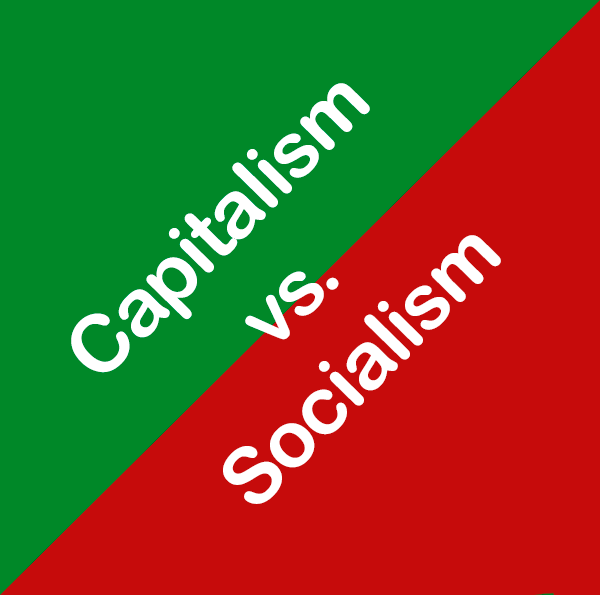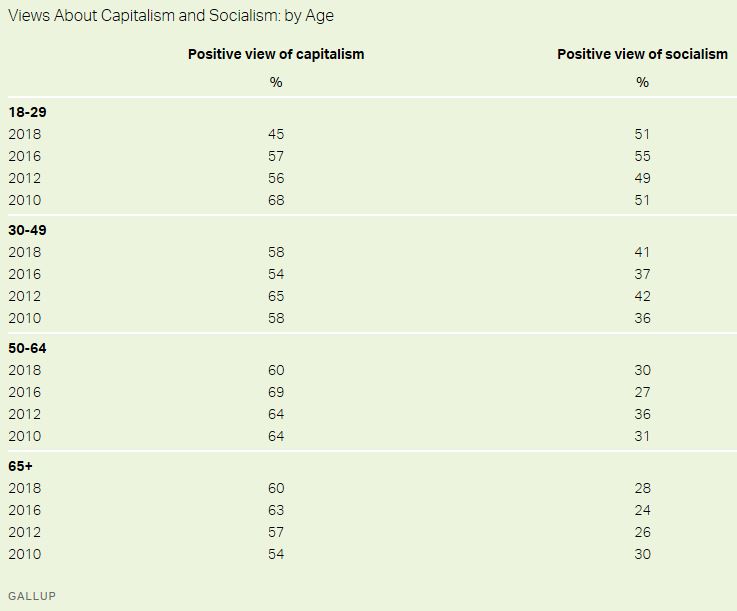
- Genuine “socialism” is a proven failure as an economic system, as suffering Venezuelans are experiencing today.
- The modern term “democratic socialism” is the fool’s gold used to lure the ill-informed into the liberal/progressive “big government” tent.
- Should Americans be concerned about socialism’s rising favorability? No, and yes.
by Lil Tuttle
“For the first time in Gallup’s measurement over the past decade, Democrats have a more positive image of socialism than they do of capitalism,” announced Gallup in a news release entitled “Democrats More Positive about Socialism than Capitalism.” Should Americans be worried? No, and yes.
Genuine “socialism”— then and now
Genuine “socialism” ― commonly defined as the government takeover and central control of all means of production (businesses, goods, resources, and services) ― was thoroughly discredited as an economic system by the Union of Soviet Socialist Republics (USSR), which collapsed in 1991 after almost 70-year attempt to make it work. (“Socialist” is so discredited, apparently, that the left now refers to the USSR simply as the “Soviet Union.”) But that’s ancient history, and who on the left has any time for history?
Today, though, a modern socialist experiment is unfolding in Venezuela. The Reuters news service posted a photo essay last week of what the final death spiral of genuine socialism looks like there: hospitals with no running water or functioning toilets, and people catching mountain water runoff because government can no longer provide this basic necessity of life.
The photo essay follows an AP story last month of the International Monetary Fund’s warning that Venezuelan inflation “could top 1 million percent by year’s end.”
Venezuela, a once wealthy oil-producing nation, is in the grips of a five-year crisis that has left many of its people struggling to find food and medicine, while driving masses across the border for relief into neighboring Colombia and Brazil.
Shortages in electricity, domestic water and public transportation plague millions of Venezuelans, who also confront high crime, the IMF noted.
Thanks to Hugo Chavez, Venezuela has been transformed by socialism in a few short decades from a thriving wealthy nation to one of abject poverty and human misery.
Two lessons become obvious in past and current experiments. Socialists make promises they can’t keep, and socialism collapses in the absence of vibrant capitalism.
Democratic Socialism―a fool’s gold
Are socialism’s advocates here at home paying attention? Apparently not.
In an essay entitled “America Might Be Ready for Democratic Socialism. It’s Not Ready for the Bill,” Brian Riedl catalogues the cost of all that free stuff proposed by liberal socialists today.
According to the left’s own sources, democratic socialism will cost $42.5 trillion in its first decade.
Here’s his breakdown of the $42.5 trillion cost:
- $32 Trillion – Medicare for All
- $188 billion – Social Security expansion
- $807 billion – Free college proposal
- $270 billion – Paid family leave
- $6.8 Trillion – guaranteed jobs
- $1 Trillion – new Senate infrastructure proposal
- $1.4 Trillion – student loan debt
The 30-year projected tab for these programs is even more staggering: new proposals costing $218 trillion, on top of an $84 trillion baseline deficit driven by Social Security, Medicare, and the resulting interest costs.
Riedl tests three paths liberal socialists might try to find $34 trillion of the $42.5 trillion needed to fund all their “free stuff.”
- Just taxing corporations and rich families: Raising the final $34 trillion would require seizing roughly 100 percent of all corporate profits as well as 100 percent of all family wage income and pass-through business income above the thresholds of $90,000 (single) or $150,000 (married), and absurdly assuming they all continue working. (This calculation refers to individual income, not investment income.)
- A European-style value-added tax (VAT), which is basically a national sales tax: A rate of 87 percent would be needed to collect $34 trillion under the American tax base.
- Payroll tax hikes: Lawmakers would need to create a new 37 percent payroll tax, on top of the existing 15.3 percent payroll tax, in order to collect $34 trillion.
And the taxes do not stop there. There is still that aforementioned baseline budget deficit of $12.4 trillion over the decade, and $84 trillion over 30 years (driven almost exclusively by growing Social Security and Medicare shortfalls).
“The democratic socialists may do well in November,” concludes Riedl. “Yet upon arriving in Washington, they will discover that even their revolution cannot repeal the laws of math.”
As Margaret Thatcher noted, socialists eventually run out of other people’s money.
Should Americans be concerned?
So, should Americans be concerned by this rising affection for socialism? No, and yes.
In the short run, probably not, David Azerrad of the Heritage Foundation told Tucker Carlson in a short television interview.
Azerrad argued that what progressives are calling “democratic socialism” is really just a more aggressive, demanding form of very big government liberalism.
Younger Americans―the primary cohort behind the uptick in socialism’s favorability (see graphic at bottom of page)―have been influenced by two things. First, the inadequate historical teaching in their schools about socialism’s history. Second, the left’s unrelenting and quite successful spin that the 2008 market crash was caused by capitalism.
It didn’t help that the crash was followed by eight years of punishing Obama Administration big government economic policies of heavy government regulation and taxation and declining wages and jobs.
With the Trump Administration, younger Americans now have an opportunity to experience a different kind of economy, one shaped by capitalism-friendly policies that lift government’s heavy regulatory and tax burden and increase jobs and wages. If they see the difference in their own lives, their opinions of capitalism and socialism could easily be reversed.
In the long run, though, the nation still has a serious problem with a public education system that continues to fail miserably in teaching economics and history to each new generation. Americans should be concerned about that.


